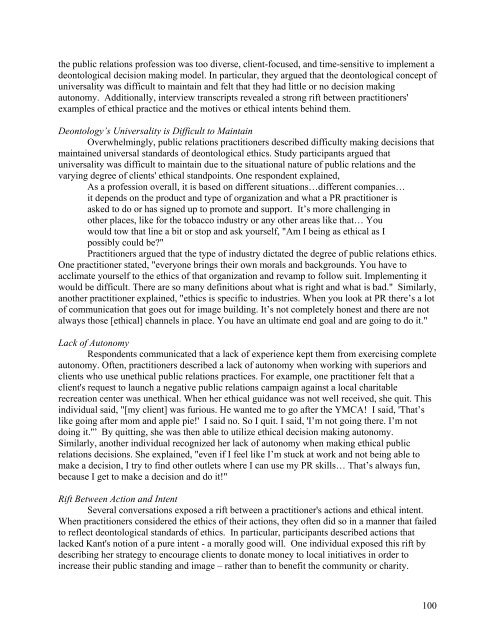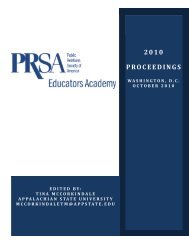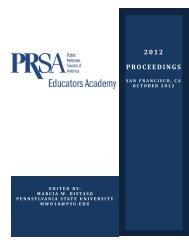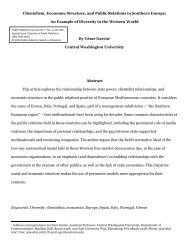2008 PROCEEDINGS - Public Relations Society of America
2008 PROCEEDINGS - Public Relations Society of America
2008 PROCEEDINGS - Public Relations Society of America
You also want an ePaper? Increase the reach of your titles
YUMPU automatically turns print PDFs into web optimized ePapers that Google loves.
the public relations pr<strong>of</strong>ession was too diverse, client-focused, and time-sensitive to implement a<br />
deontological decision making model. In particular, they argued that the deontological concept <strong>of</strong><br />
universality was difficult to maintain and felt that they had little or no decision making<br />
autonomy. Additionally, interview transcripts revealed a strong rift between practitioners'<br />
examples <strong>of</strong> ethical practice and the motives or ethical intents behind them.<br />
Deontology’s Universality is Difficult to Maintain<br />
Overwhelmingly, public relations practitioners described difficulty making decisions that<br />
maintained universal standards <strong>of</strong> deontological ethics. Study participants argued that<br />
universality was difficult to maintain due to the situational nature <strong>of</strong> public relations and the<br />
varying degree <strong>of</strong> clients' ethical standpoints. One respondent explained,<br />
As a pr<strong>of</strong>ession overall, it is based on different situations…different companies…<br />
it depends on the product and type <strong>of</strong> organization and what a PR practitioner is<br />
asked to do or has signed up to promote and support. It’s more challenging in<br />
other places, like for the tobacco industry or any other areas like that… You<br />
would tow that line a bit or stop and ask yourself, "Am I being as ethical as I<br />
possibly could be?"<br />
Practitioners argued that the type <strong>of</strong> industry dictated the degree <strong>of</strong> public relations ethics.<br />
One practitioner stated, "everyone brings their own morals and backgrounds. You have to<br />
acclimate yourself to the ethics <strong>of</strong> that organization and revamp to follow suit. Implementing it<br />
would be difficult. There are so many definitions about what is right and what is bad." Similarly,<br />
another practitioner explained, "ethics is specific to industries. When you look at PR there’s a lot<br />
<strong>of</strong> communication that goes out for image building. It’s not completely honest and there are not<br />
always those [ethical] channels in place. You have an ultimate end goal and are going to do it."<br />
Lack <strong>of</strong> Autonomy<br />
Respondents communicated that a lack <strong>of</strong> experience kept them from exercising complete<br />
autonomy. Often, practitioners described a lack <strong>of</strong> autonomy when working with superiors and<br />
clients who use unethical public relations practices. For example, one practitioner felt that a<br />
client's request to launch a negative public relations campaign against a local charitable<br />
recreation center was unethical. When her ethical guidance was not well received, she quit. This<br />
individual said, "[my client] was furious. He wanted me to go after the YMCA! I said, 'That’s<br />
like going after mom and apple pie!' I said no. So I quit. I said, 'I’m not going there. I’m not<br />
doing it.'” By quitting, she was then able to utilize ethical decision making autonomy.<br />
Similarly, another individual recognized her lack <strong>of</strong> autonomy when making ethical public<br />
relations decisions. She explained, "even if I feel like I’m stuck at work and not being able to<br />
make a decision, I try to find other outlets where I can use my PR skills… That’s always fun,<br />
because I get to make a decision and do it!"<br />
Rift Between Action and Intent<br />
Several conversations exposed a rift between a practitioner's actions and ethical intent.<br />
When practitioners considered the ethics <strong>of</strong> their actions, they <strong>of</strong>ten did so in a manner that failed<br />
to reflect deontological standards <strong>of</strong> ethics. In particular, participants described actions that<br />
lacked Kant's notion <strong>of</strong> a pure intent - a morally good will. One individual exposed this rift by<br />
describing her strategy to encourage clients to donate money to local initiatives in order to<br />
increase their public standing and image – rather than to benefit the community or charity.<br />
100
















